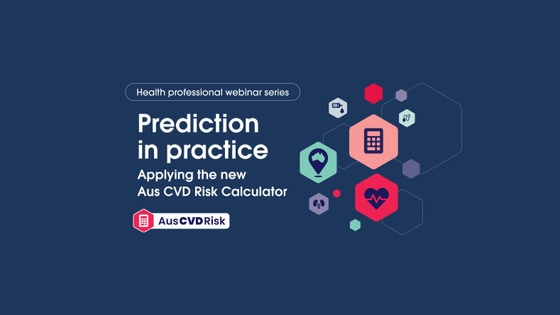
Webinar: Unpacking diabetes and the heart: Latest on risk and management strategies
People with diabetes have up to twice the risk of cardiovascular disease compared with people without the condition.1 People with diabetes also face coronary heart disease as a leading cause of death.2 Managing CVD risk in this group is undoubtedly critical.
Hosted live by the Heart Foundation in partnership with the World Heart Federation and the Australian Diabetes Society, this webinar explores the latest evidence on CVD and diabetes. Expert panelists discuss the link between CVD risk and diabetes, as well as pharmacological strategies for the prevention of the two conditions.
Duration: 1 hour
Date recorded: 28 July 2022
Topics covered:
How to stratify CVD risk within a diabetes cohort – who is at highest risk?
Updates on diabetes pharmacological therapies and their cardiovascular benefits
The fourth pillar of heart failure management – how are diabetes medicines used to treat heart failure
Practical advice on motivational and behavioural strategies to support improvements in CVD risk factor management
Expert panelists
Rod Jackson
Professor of Epidemiology, University of Auckland
Professor Rod Jackson is a Professor of Epidemiology at the University of Auckland, New Zealand. He trained in medicine and completed his PhD in epidemiology at the University of Auckland. He has taught courses in epidemiology and in evidence-based medicine for about 30 years and has about 40 years of research experience in CVD epidemiology. He currently leads a ‘big-health data’ research programme that generates very large cohort studies (over 500,000 participants) from web-based clinical decision support systems in primary and secondary care and national routine health data linkage cohorts of over two million people. He has published over 350 peer-reviewed papers.

Richard O’Brien
Consultant endocrinologist, Reservoir Private Hospital. Clinical Dean of Medicine, University of Melbourne
Professor Richard O’Brien is Clinical Dean of Medicine at the University of Melbourne, Austin Health and Director, Graduate Programs and Executive Education, Melbourne Medical School. He is Director of the Lipid Service and a senior endocrinologist at Austin Health in Melbourne. His research work has focussed mainly on diabetes and atherosclerosis, and he has authored numerous scientific papers on these subjects. Professor O’Brien is the President of the Asian Pacific Society of Atherosclerosis and Vascular Diseases. In addition to his university responsibilities, he has ongoing involvement in direct patient care and research.

Ingrid Hopper
General physician and clinical pharmacologist, Alfred Hospital
Associate Professor Ingrid Hopper is a general physician and clinical pharmacologist at the Alfred Hospital in Melbourne where she performs clinical duties in general medicine and a multi-disciplinary heart failure clinic. Her particular interest is heart failure in the elderly, and she completed her PhD in heart failure and is now Associate Professor in chronic disease and the aging at the Monash School of Public Health and Preventive Medicine. She has contributed to over 100 papers and technical reports, including the 2018 Australian heart failure guidelines.

Roy Rasalam
General Practitioner, Townsville Family Medical Centre
Dr Roy Rasalam has over 25 years’ experience working in primary and tertiary care. He manages adults with type 1 and type 2 diabetes in his private clinic and has a position in public health medicine at Townsville University Hospital. He is co-author of the Diabetes Australia/RACGP Type 2 Diabetes guidelines and is a researcher in diabetes and CVD.

This event was hosted in partnership with the World Heart Federation and Australian Diabetes Society.
.png?format=pjpg&auto=webp)
References
1. Australian Institute of Health and Welfare. Heart, stroke and vascular disease: Australian facts. 2023. Accessed 18 Jan 2024. www.aihw.gov.au/reports/heart-stroke-vascular-disease/hsvd-facts/contents/risk-factors/diabetes
2. Australian Institute of Health and Welfare. Diabetes: Australian facts. 2023. Accessed 18 Jan 2024. https://www.aihw.gov.au/reports/diabetes/diabetes/contents/comorbidity-of-diabetes
You might also be interested in...

Lifestyle management
Lifestyle advice and referral programs to help reduce CVD risk. Physical activity and a heart-healthy diet can help manage CVD risk factors such as high blood pressure, high blood cholesterol, obesity and diabetes.

Practical guide to pharmacological lipid management
Pharmacological guide and resources to help you manage patients with high cholesterol.

Webinar: Prediction in practice: Applying the new Aus CVD Risk Calculator
The new 2023 Australian Guideline for assessing and managing cardiovascular disease (CVD) risk provides the latest evidence, practical advice and tools for CVD risk assessment and management in primary care.
Last updated11 February 2025